- Home
- Rudy Rucker
Complete Stories Page 10
Complete Stories Read online
Page 10
I have resolved to make him murder me. The exquisite uncertainty of how he will do it. I feel like a virgin bride.
Mema has gone to the butcher to buy two kilograms of blood-sausage. Tonight I will chew the sausage up for LVIII. My true blood must belong to Herr B.
31 January 1981.
The blood-sausage was everything I had ever dreamed it to be. Thick and dark, with the texture of excrement, the congealed pigs’ blood is stuffed into a greasy casing made of the animals’ own small intestines.
Leaning over the long basin, chewing and spitting up, I felt a disgust purer and more complete than anything I have experienced since the time of the camps.
The sausage-casing is stamped with repeated pictures of a pig wearing a crown and making obeisances. I have stretched the casing enough to wrap it around my waist, like the little tailor who killed seven with one blow.
The chewing of the sausage took a long time, and I fell asleep in a sort of ecstasy, with my forehead resting on the rim of the long basin. I awakened to a touch of LVIII’s hand, tugging petulantly at my hair. I started back, uncertain where I was, and heard the church tower toll three.
Filled with an implacable strength, I descended the stairs. Mema lay sleeping on her cot in the kitchen. I unplugged the phone and brought it upstairs. Then I crawled under my bed to muffle the sound, and dialed Felice’s number over and over.
The shining love-words dripped off my lips that still glistened with blood-sausage. My tongue felt slender, magically flexible, as if it could pierce the phone wires and the shell of her ear. After my second call, her father answered, and I gibbered like a golem, ever-new inspirations striking me with each call. I continued calling for two hours. They answered less and less often, and finally not at all. Now I have left my phone off the hook to keep theirs ringing.
Franz K. LVIII is sloshing about in the long basin, impatient for the final spark. The dawn strikes through my window and gilds this page, the last of this volume. Now, before Mema awakes, I must go to pound on Felice’s door, a long knife in my hand.
============
Note on “The 57th Franz Kafka”
Written in Spring, 1980.
The Little Magazine, Vol. 13, Nos. 3 & 4, 1982.
In Heidelberg I read and reread the Penguin Modern Classics edition of The Diaries of Franz Kafka. The physical setting of this story was the house of my Heidelberg friend Imre Molnar who lived down the hill from us on the Schlierbacher Landstrasse. Imre himself appears as Huba in The Sex Sphere, but he had nothing to do with the character in “The 57th Franz Kafka.”
The name for the story comes from the fact that the story is set in 1981, which was fifty-seven years after Kafka’s 1924 death. I used this story’s name for my first story anthology because I had the fantasy that people would like my stories so much that I would be considered a “new Franz Kafka”— certainly not the first “new Franz Kafka,” but maybe the fifty-seventh.
The Little Magazine at that time was co-edited by David Hartwell, who’d eventually become my editor at Tor Books.
The Indian Rope Trick Explained
(With excerpts from Revell Gibson’s “Transdimensional Avatar.”)
Paris was backwards. Charlie Raumer sat on a patch of grass near the Louvre trying to straighten it out. The kids were fighting, Cybele wasn’t speaking to him, and all around was the mirror-image of the Paris he remembered from twelve years ago.
He buried his face in his hands, pushing at the misty red memories. He imagined a Paris made of glass, a relief map. If you looked at it from the wrong side, everything would be backwards, inside-out. He began tugging at the surfaces in his image to put them right. Something began…there was a heavy thud on his back.
It was Iris, the ten-year-old. “What’s the matter, Daddy, are you drunk?” She broke into a wild giggle at this sally, and her two little brothers joined in, pigs at the party. They piled onto his back with a confused squealing. Someone shrieked, “POKE!” and little Jimmy fell crying to the ground.
Raumer’s teeth clenched. “Iris, you stop it or …”
“It was Howard,” she yelled with a grimace at the larger of her two little brothers. Distrusting speech, Howard charged her, arms windmilling. Raumer seized the two and shook them hard. Their little faces looked crooked and ugly.
“Stop, stop, stop!” It was Cybele, back with a precious paper bag of postcards. When she was a girl she had spent every Sunday in the Louvre. But now that she was finally here again, her family had refused to come inside.
“Mine, Mama. Me.” Jimmy took an uncertain step forwards. Howard snaked past him and snatched the cards from his mother. Iris cross-checked Howard and they hit the ground together.
Raumer dealt out two back-handed slaps and recovered the cards. The printing on the museum shop bag was reversed. He wished he had never started fooling with the Hinton hypercube models.
“Is that all you can do?” his wife was demanding, an orchid of anger blossoming in her voice. “Beat them? Why don’t you ever help me instead of ruining our …”
All this time a part of Raumer’s mind had been fiddling with his image of Paris. Now instead of trying to make it come right he let it be backward, let himself go. He felt a rush of freedom. And disappeared.
He snapped back on the steps of the Louvre, thirty meters away. Nothing looked backwards anymore. In a twinkling instant the two heavily ornamented wings of the building had changed places. His tail-bone hurt where he’d dropped onto the steps. Across the road he could see Cybele and the kids looking for him.
“Bhom bhom bho-la?”
Raumer turned. A tall African was hunkering just behind him. A street-vendor. They were all over Paris this June. White plastic ivory elephants, brittle leather belts, strangely patterned wallets, and the little drums mounted on sticks. The vendor was twirling one of the drums between his fingers. There were two clay marbles attached with string, and when the drum twirled, the marbles rattled on the taut skins. “Bhom bhom bho-la?”
“Non merci. Pas acheter.” As he tried to brush the peddler off, the utter strangeness of what had just happened was hitting Raumer. He had been over there, and now he was here. Had he blacked out? But there was nothing stronger than coffee and a hangover in his system. Across the road, Iris squealed and pointed up at him.
“Je vous le donne,” the African said, holding out the little drum. Still twirling it. Pattapattapattapat. “Pour devenir sauteur.” Serious eyes under a high, noble forehead.
Raumer took the drum. For becoming a jumper. So the African had seen. Raumer had really jumped thirty meters. But …
Iris came pumping up the steps, her eyes fixed on the toy. “Can it be mine, Dad?”
A light touch of long fingers on Raumer’s shoulder. “Inquirez devant le Centre Pompidou.” He turned to thank, to ask, but the tall African was already gliding down the steps, no leg-movements visible under his black and yellow dashiki.
Iris was tugging at the drum now. One of the little clay marbles came off and bounced down the steps. Raumer bared his teeth at the child, then retrieved the ball. He slipped it into his coat pocket with the drum before the others could start in.
“You didn’t have to run off like that,” Cybele said, looking not quite pleased to have found him. “We didn’t even see you cross the street.”
“Daddy bought a toy drum, and it’s mine,” Iris announced. Jimmy’s face quivered, and Howard stepped forward, alert eyes fixed on the bulge in Raumer’s pocket.
“What is the matter with you children?” Cybele demanded. “Can’t you stop asking for things for one minute?”
“I’ll get them each a drum,” Raumer muttered. Four of the Africans were standing in a group ten meters away. Impassively, with long arcing gestures, they were working a stream of Canadian tourists. They could have been catching fish. Raumer hesitated, trying to decide which one he had talked with.
“You will not,” Cybele said, taking his arm. An old lady had just stepped out of a
cab and onto the curb next to them. Cybele called to the cab driver in rapid French, then herded Raumer in. “I am going to feed you and these children before you murder each other.”
Raumer had a veal cutlet with a fried egg on it; Cybele had calf-brains in brown butter; and the kids each had a little steak with pommes frites. Coffee, apple juice, wine…they were all smiling at each other. A cool June day in Paris. It’s ridiculous what a difference food makes. The kids drifted across the cheap restaurant to play pinball with two francs they had scrounged.
Raumer took the toy drum out of his pocket to tie the string Iris had snapped. “So you did buy one,” Cybele said, lighting a cigarette. “It’s cute.”
“One of those Africans gave it to me,” Raumer said. “For jumping thirty meters through hyperspace.”
“What are you talking about?”
“I figure that’s what happened. When I disappeared. I’d been having that mirror-image feeling again and …”
Cybele sighed a cloud of smoke. “This is our vacation, Charlie. Our last chance. Can’t you wait till you’re back in your library to be so crazy?” She tried to soften the last word with a strained smile.
“I don’t think it’s crazy to be writing a book on the history of the fourth dimension. What am I supposed to do…walk around holding your hand as if we were still courting?”
“It might be nice.” Suddenly her reserve broke. “Oh, Charlie, don’t you care? We fell in love here. And if now all we can do is…fight…then we’re …” She held a supplicating hand out across the table.
“My jumping like that fits in with the theory I found in the Hinton book,” Raumer said slowly, not really noticing his wife. “We have a slight thickness in the fourth dimension. We’re like coins sliding around on a table-top. Our consciousness is down with the table-top…but if you somehow identify with the top side of the coin then things look backwards. At the Louvre I finally let myself go all the way up. The momentum flipped me right off the board. I could have come down anywhere. I could have come down backwards or sideways …”
While he talked, Raumer twirled the carved rod sticking out of the little tom-tom’s side. The strings and weights followed along, trailing like a galaxy’s spiral arms. When he reversed direction, the little marbles pattered on the tight skins. He rolled the stick back and forth, getting the hang of it. Pattapat. Pattapattapat.
“You don’t…you don’t really …” Cybele began, then gave up. “Why don’t we all rest and then go see the Pompidou Art Center at Beaubourg?” she suggested in a charged, artificially bright voice. “I hear it’s the kind of place where you and the kids won’t get bored.”
A wail cut the air. Howard. Iris had pushed the reset button on the pinball machine, and Howard’s franc had been lost. Raumer went over to put in another coin.
The machine was called Dimension Warp. The glass scoreboard carried a bright picture of two women learning the ropes from a hyperspace pilot who’s a robot. Those naughty cuties are taking notes and licking the points of their thick pencils…while that jivey robobopster fingers the controls. The player as machine, courting curvy Nature. Groovy.
Raumer split three games with Iris and Howard. Jimmy got to pull the plunger. The machine had an unusual feature, a little ramp a ball could jump over to land somewhere else on the board…in a special and otherwise inaccessible free-game hole if you were lucky. The cover-glass was set up high enough so the ball could sail quite a distance before clacking back into the plane of normal play.
“That’s what you did, Daddy,” Howard said the first time the ball made its trip through the third dimension.
“What do you mean?” Raumer gave his son a sharp look. He couldn’t always tell what went on behind that smooth seven-year-old forehead.
“He means that your turn’s over,” Iris interjected. They left it at that.
Their hotel was nearby, and Cybele wanted to go up to rest and change shoes. Little Jimmy needed a nap and Iris wanted to keep an eye on her mother. Eager to avoid the possibility of another ugly scene in the tiny hotel room, Raumer proposed that he kill some time with Howard and meet the others in front of the Pompidou Center in an hour and a half. Cheerfully, father and son boarded the Metro.
In between stations the DuBonnet ads flickered past. DUBO…DU-BON…DUBONNET…DUBO…DUBON…DUBONNET…Over and over. A pun. Du beau: lovely; du bon: tasty. Cybele had explained it to him the first time he’d come to Paris. Twelve years now. She’d been an art student then and he’d been at the Université on a scholars exchange program. An American machine courting a French cutie. Somehow he’d won her. But now he only wondered why he’d wanted to.
“What if the ball went under the board like a subway?” Howard asked suddenly, his big opened eyes reflecting in the black glass.
Cybele had told Raumer about Howard’s long ruminations. “All the machinery, the electrical stuff, is under the board,” he smiled. “The ball would probably get stuck, half under and half over.”
He had a sudden impulse to talk to the boy, to teach him something. He hardly knew the child, really. In the normal run of things Cybele did all the work with the children.
“Imagine this, Howard. Imagine that there were pictures that could slide around just on the pinball board. What would the ball look like to them when it rolled around?”
“Like a ball.”
“No, dummy. If all they could see was what touched their plane, then the ball would look like a dot moving around.”
“Unless you pushed it through.”
“That’s right. If you pushed the ball through the plane they’d see a circular cross-section. And when the ball jumps off the ramp, they’d think it had disappeared.”
“Why do you call it a cross-section? Cross means X.”
“It can mean cutting, too. If I had a real big sharp knife I could make a cross-section of you…cut you down the middle and shave off a nice thin …” Raumer stopped himself. That was no way to talk to a child. What was the matter with him?
At the next stop they had to change trains. Raumer’s memory was still playing tricks on him…they caught their connecting train in the wrong direction. Upset, he yelled at Howard for wanting to go to the bathroom.
When they finally got to the right stop, the boy’s face had turned into a tight little mask. Raumer suddenly realized that no one in his family really liked him. They had no reason to. Trying to buy a smile, he gave Howard the toy drum. No reaction. They climbed the stairs, and stepped out into the plaza next to the Centre Pompidou.
The building itself is as wonderful as anything in it. It is built inside-out, with all the structural supports, heating shafts, escalators, plumbing and electrical conduits attached to the outside walls. The machinery is all outside, and the traditional decoration is all hanging on the walls inside. The marvelous joke is that a lot of those functional-looking pipes outside are fake…pure this-is-not-a-decoration decoration. It isn’t enough for the building to be inside out, it has to look inside out.
The plaza was dotted with idlers, many of them arranged into circles around street-performers: a juggler, a fire-eater lying on a mound of broken glass, and a crazy man shouting fifty years too late about the surrealist staple of rayons ultraviolets. The chilly breeze was snatching the words out of people’s mouths and scattering them around the big square.
Right by the subway stairs there were a few sidewalk artists waiting for people to drop coins onto the pastels they’d drawn on the stone ground. One of the artists had filled in the black outline of a boy with fanciful pictures of body organs and thoughts.
Howard begged till Raumer put half a franc on the man’s picture, and then he pulled his father over to join a group watching a snake-charmer. Snakers are supposed to be Indian, but this charmer was another of the dashiki-clad Africans.
He was squatting on a piece of cloth patterned with squares and slanting lines. His snakes writhed sluggishly and spilled out of a big wicker basket. His flute was a gourd with two pipes
sticking out. One pipe had holes for fingering the eerie, wandering notes, and the other let air out to play on the face of the snake being charmed.
A cobra on the basket top wove back and forth, following the movements of the snaker’s flute. Its hood was spread menacingly, and occasionally it made as if to strike. The tune drifted up and down a pentatonic scale, weaving like the snake’s body. Little Howard began twirling his drum in accompaniment. Typically, he’d been able to play it as soon as Raumer gave it to him.
When the snaker heard the sound of the pattering, his eyes flashed at them. The tune speeded up, and Howard kept pace. Slowly the snaker rose to a crouch, drawing the cobra higher and higher. Finally he was standing erect on his long legs and the cobra had reared up to an impossible height. Raumer hoped its venom sacs were gone. The music cut off abruptly and the cobra collapsed back to a great, shifting coil.
“Bhom bhom bho-la!” the African shouted. He was an imposing man with stiff ebony features. A few coins pattered onto the tessellated cloth beneath his feet. “Dix francs de plus et je vous montre une merveille!” He held out his ten fingers. He wanted more money.
Perhaps this was the man he’d been told to see, Raumer thought. That African by the Louvre had said something about coming here. On a sudden impulse he fingered a limp bill out of his pocket and tossed it onto the snaker’s cloth. Ten francs. It seemed like play-money.
“Merci, Monsieur De L’Espace,” the tall black man said with a slight bow. “Et maintenant! Le truc Indien!” He whistled sharply, penetratingly, and a young African boy in shorts came running across the square, carrying a heavy coiled rope.
The snaker gave a longer speech then, but Raumer couldn’t follow it. What had the man called him? Mister Space? He couldn’t figure it out. What a strange day this was. First that funny gap or jump near the Louvre…and now this snake charmer was making a rope uncoil and slowly rise into the air.

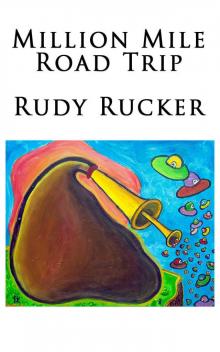 Million Mile Road Trip
Million Mile Road Trip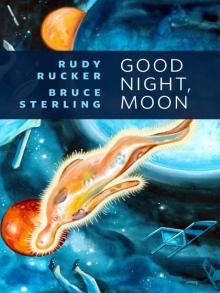 Good Night, Moon
Good Night, Moon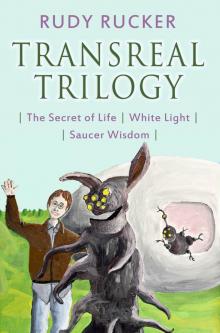 Transreal Trilogy: Secret of Life, White Light, Saucer Wisdom
Transreal Trilogy: Secret of Life, White Light, Saucer Wisdom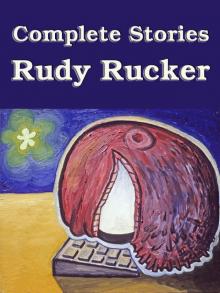 Complete Stories
Complete Stories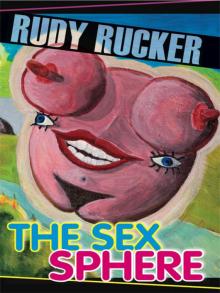 The Sex Sphere
The Sex Sphere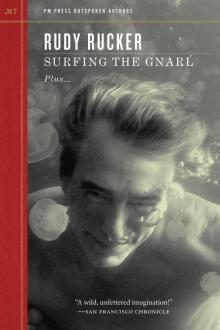 Surfing the Gnarl
Surfing the Gnarl Software
Software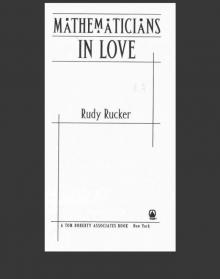 Mathematicians in Love
Mathematicians in Love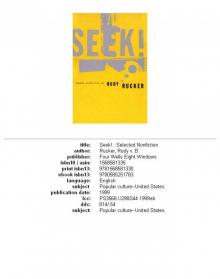 Seek!: Selected Nonfiction
Seek!: Selected Nonfiction The Secret of Life
The Secret of Life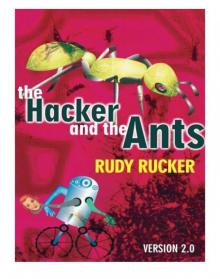 The Hacker and the Ants
The Hacker and the Ants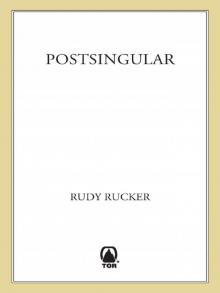 Postsingular
Postsingular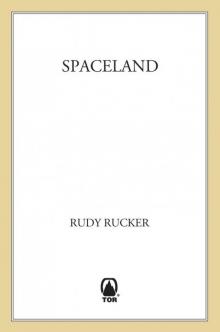 Spaceland
Spaceland Transreal Cyberpunk
Transreal Cyberpunk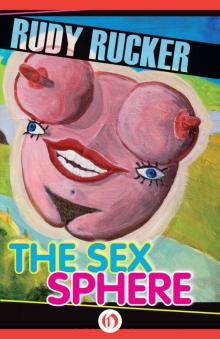 Sex Sphere
Sex Sphere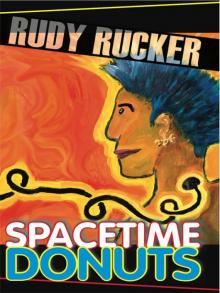 Spacetime Donuts
Spacetime Donuts Freeware
Freeware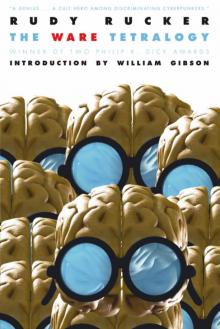 The Ware Tetralogy
The Ware Tetralogy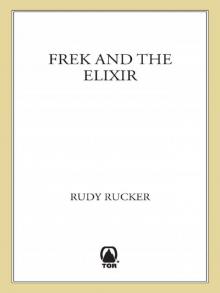 Frek and the Elixir
Frek and the Elixir Junk DNA
Junk DNA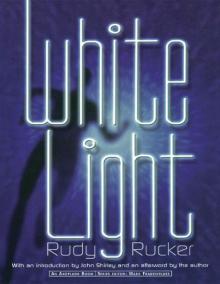 White Light (Axoplasm Books)
White Light (Axoplasm Books)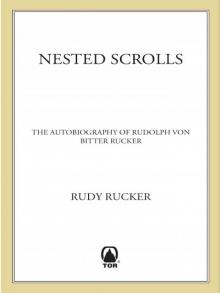 Nested Scrolls
Nested Scrolls Inside Out
Inside Out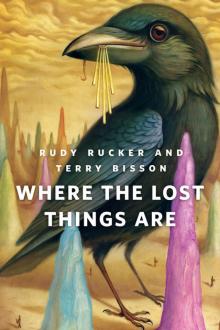 Where the Lost Things Are
Where the Lost Things Are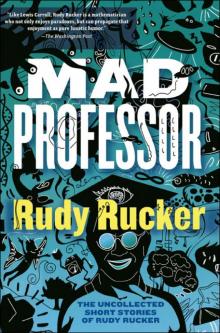 Mad Professor
Mad Professor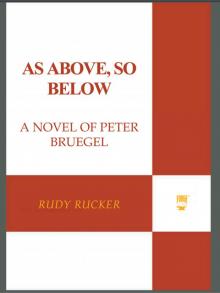 As Above, So Below
As Above, So Below Realware
Realware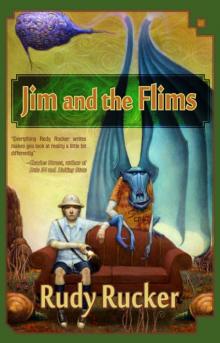 Jim and the Flims
Jim and the Flims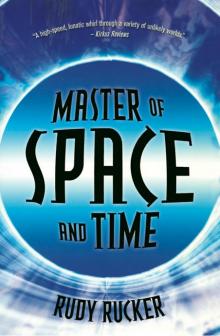 Master of Space and Time
Master of Space and Time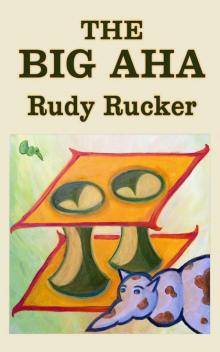 The Big Aha
The Big Aha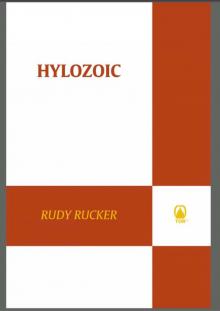 Hylozoic
Hylozoic